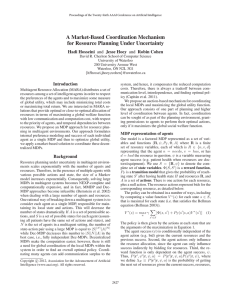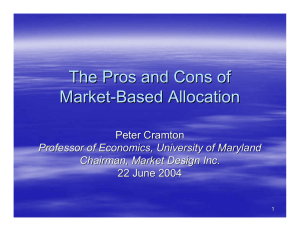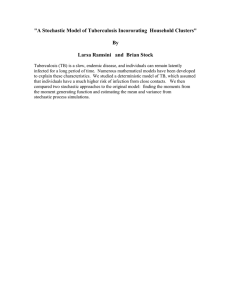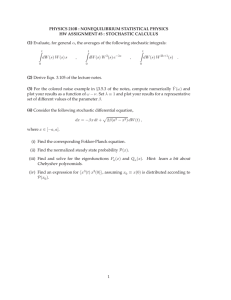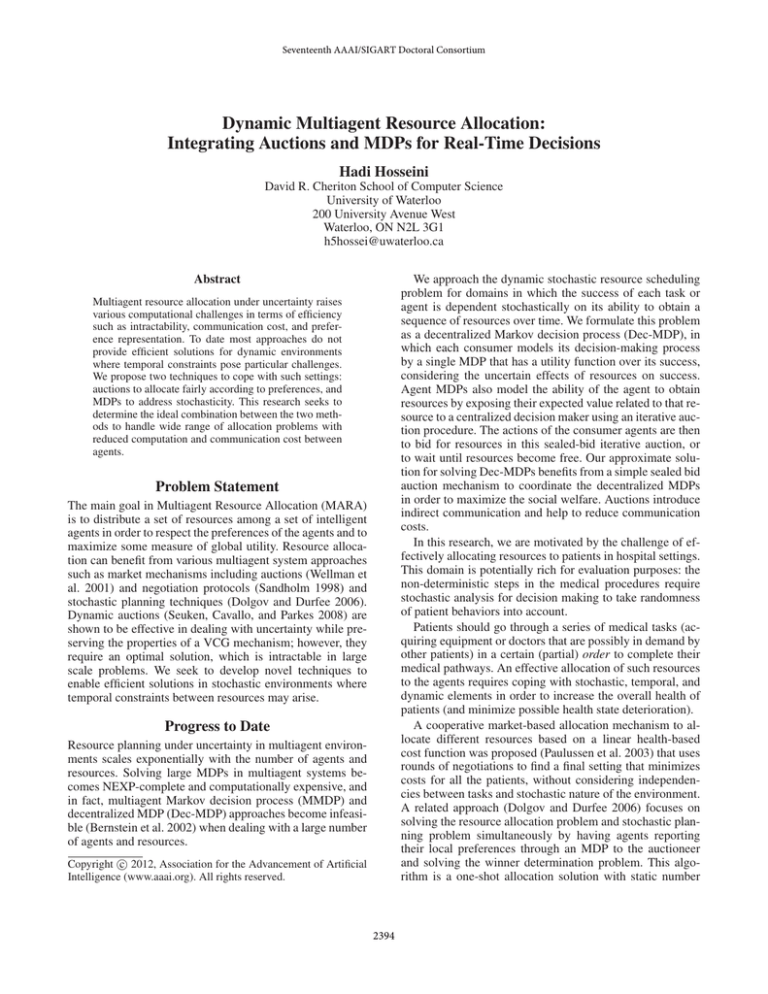
Seventeenth AAAI/SIGART Doctoral Consortium
Dynamic Multiagent Resource Allocation:
Integrating Auctions and MDPs for Real-Time Decisions
Hadi Hosseini
David R. Cheriton School of Computer Science
University of Waterloo
200 University Avenue West
Waterloo, ON N2L 3G1
h5hossei@uwaterloo.ca
Abstract
We approach the dynamic stochastic resource scheduling
problem for domains in which the success of each task or
agent is dependent stochastically on its ability to obtain a
sequence of resources over time. We formulate this problem
as a decentralized Markov decision process (Dec-MDP), in
which each consumer models its decision-making process
by a single MDP that has a utility function over its success,
considering the uncertain effects of resources on success.
Agent MDPs also model the ability of the agent to obtain
resources by exposing their expected value related to that resource to a centralized decision maker using an iterative auction procedure. The actions of the consumer agents are then
to bid for resources in this sealed-bid iterative auction, or
to wait until resources become free. Our approximate solution for solving Dec-MDPs benefits from a simple sealed bid
auction mechanism to coordinate the decentralized MDPs
in order to maximize the social welfare. Auctions introduce
indirect communication and help to reduce communication
costs.
In this research, we are motivated by the challenge of effectively allocating resources to patients in hospital settings.
This domain is potentially rich for evaluation purposes: the
non-deterministic steps in the medical procedures require
stochastic analysis for decision making to take randomness
of patient behaviors into account.
Patients should go through a series of medical tasks (acquiring equipment or doctors that are possibly in demand by
other patients) in a certain (partial) order to complete their
medical pathways. An effective allocation of such resources
to the agents requires coping with stochastic, temporal, and
dynamic elements in order to increase the overall health of
patients (and minimize possible health state deterioration).
A cooperative market-based allocation mechanism to allocate different resources based on a linear health-based
cost function was proposed (Paulussen et al. 2003) that uses
rounds of negotiations to find a final setting that minimizes
costs for all the patients, without considering independencies between tasks and stochastic nature of the environment.
A related approach (Dolgov and Durfee 2006) focuses on
solving the resource allocation problem and stochastic planning problem simultaneously by having agents reporting
their local preferences through an MDP to the auctioneer
and solving the winner determination problem. This algorithm is a one-shot allocation solution with static number
Multiagent resource allocation under uncertainty raises
various computational challenges in terms of efficiency
such as intractability, communication cost, and preference representation. To date most approaches do not
provide efficient solutions for dynamic environments
where temporal constraints pose particular challenges.
We propose two techniques to cope with such settings:
auctions to allocate fairly according to preferences, and
MDPs to address stochasticity. This research seeks to
determine the ideal combination between the two methods to handle wide range of allocation problems with
reduced computation and communication cost between
agents.
Problem Statement
The main goal in Multiagent Resource Allocation (MARA)
is to distribute a set of resources among a set of intelligent
agents in order to respect the preferences of the agents and to
maximize some measure of global utility. Resource allocation can benefit from various multiagent system approaches
such as market mechanisms including auctions (Wellman et
al. 2001) and negotiation protocols (Sandholm 1998) and
stochastic planning techniques (Dolgov and Durfee 2006).
Dynamic auctions (Seuken, Cavallo, and Parkes 2008) are
shown to be effective in dealing with uncertainty while preserving the properties of a VCG mechanism; however, they
require an optimal solution, which is intractable in large
scale problems. We seek to develop novel techniques to
enable efficient solutions in stochastic environments where
temporal constraints between resources may arise.
Progress to Date
Resource planning under uncertainty in multiagent environments scales exponentially with the number of agents and
resources. Solving large MDPs in multiagent systems becomes NEXP-complete and computationally expensive, and
in fact, multiagent Markov decision process (MMDP) and
decentralized MDP (Dec-MDP) approaches become infeasible (Bernstein et al. 2002) when dealing with a large number
of agents and resources.
c 2012, Association for the Advancement of Artificial
Copyright Intelligence (www.aaai.org). All rights reserved.
2394
I anticipate addressing a number of challenging research
questions as part of this topic. Included is how to effectively
reason about expected future outcomes in a planning horizon
model. Another is examining the relative value of regretbased or reward-based bidding for the MDP-based auction
component. Finally, the most critical challenge will be to
support large-scale resource planning problems where realtime decision making is vital.
In the next 2 years, I will integrate these mentioned techniques to provide a more effective solution for MARA. This
will result in dual contributions to the fields of stochastic
planning using MDPs (integrating market-oriented coordination solutions) and the design of multiagent auctions (with
rich preference representation for bidding and proposals for
addressing challenges in solving combinatorial auctions).
Researchers in both subfields will thus benefit as we demonstrate how best to combine these techniques into a comprehensive solution.
of agents and no re-allocation of resources is allowed afterwards. Thus, it is not applicable to environments with dynamic agents or resources because the formulation should be
modified by each change to compute a new allocation. In a
preliminary paper, we have shown (Hosseini, Hoey, and Cohen 2011) that our Dec-MDP approach copes with dynamic
allocation of resources under uncertainty (as it uses multiagent stochastic planning) and converges fast with low communication cost (as it uses an auction mechanism), while
addressing temporal preferences.
Proposed Plan for Research
The first step will be to conduct more extensive validation, in
order to improve the results. The primary aim is to then offer
a more generalized approach for domains beyond health.
Combinatorial auctions (CAs) allow bidders to express
their true preferences and valuations over the combination of
items (or bundles) (in MARA, a full preference model over
all possible sets of resources) that results in more effective
allocations in terms of total economic efficiency (Cramton,
Shoham, and Steinberg 2006). I plan to study combinatorial bidding mechanisms and bidding languages (Boutilier
and Hoos 2001; Nisan 2000) to deal with situations where
agents need to expose a richer preference model in order
to optimize the allocation process. MDPs can potentially be
used in combinatorial bidding processes in which agents reveal their valuations over a bundle of items by reasoning on
the future expected outcomes. This can reduce the complexity of the bidding model in combinatorial bidding process by
eliminating the paths that could lead into smaller or negative
expected outcomes. I plan to theoretically study the use of
MDPs as stochastic mechanisms for preference representation in CAs.
In auction-based mechanisms, the assumption is that auctioneers are reliable and trustworthy, although they may lack
sufficient information about the requesting agents (as the
communication is just through passing bids). However, from
another perspective resource agents can negotiate over consumer agents (patients in the healthcare scenario) in some
negotiation rounds and enforce understandings while competing with each other in order to make an agreement over
the final Pareto-optimal assignment. One future direction
would be for me to study the integration of such techniques
to the context of MARA problems.
Another future direction would be defining fairness criterion along with addressing optimality and social welfare.
Defining fairness in terms of envy-freeness does not necessarily result in optimal solutions (Sandholm 1999). One
interesting direction would be to study envy-reducing strategies in negotiation protocols and GVA mechanisms that can
potentially lead into efficient allocation of resources.
In the side of stochastic planning, I plan to apply
the auction-based coordination technique to Dec-POMDPs
where the states of obtaining resources and progression is
partially observable through an agent’s observation on environment dynamics, which may include a probability distribution over all the resource requests. This opens up an interesting direction in solving large-scale resource planning
problems using Dec-POMDPs.
References
Bernstein, D.; Givan, R.; Immerman, N.; and Zilberstein, S.
2002. The complexity of decentralized control of Markov
decision processes. Mathematics of operations research
27(4):819–840.
Boutilier, C., and Hoos, H. 2001. Bidding languages for
combinatorial auctions. In International Joint Conference
on Artificial Intelligence, volume 17, 1211–1217. Lawrence
Erlbaum Associates LTD.
Cramton, P.; Shoham, Y.; and Steinberg, R. 2006. Introduction to combinatorial auctions.
Dolgov, D., and Durfee, E. 2006. Resource allocation
among agents with mdp-induced preferences. Journal of Artificial Intelligence Research 27(1):505–549.
Hosseini, H.; Hoey, J.; and Cohen, R. 2011. Multi-agent
patient scheduling through auctioned decentralized mdps. In
Proceedings of the 6th INFORMS Workshop on Data Mining
and Health Informatics (DM-HI 2011), 73–78.
Nisan, N. 2000. Bidding and allocation in combinatorial
auctions. In Proceedings of the 2nd ACM conference on
Electronic commerce, 1–12. ACM.
Paulussen, T.; Jennings, N.; Decker, K.; and Heinzl, A.
2003. Distributed patient scheduling in hospitals. In International Joint Conference on Artificial Intelligence, volume 18, 1224–1232. Citeseer.
Sandholm, T. 1998. Contract types for satisficing task allocation. In Proceedings of the AAAI spring symposium:
Satisficing models, 23–25.
Sandholm, T. 1999. Distributed rational decision making.
Multiagent systems: a modern approach to distributed artificial intelligence 201–258.
Seuken, S.; Cavallo, R.; and Parkes, D. 2008. Partiallysynchronized dec-mdps in dynamic mechanism design. In
AAAI, volume 8, 162–169.
Wellman, M.; Walsh, W.; Wurman, P.; and MacKie-Mason,
J. 2001. Auction protocols for decentralized scheduling*
1,* 2. Games and Economic Behavior 35(1-2):271–303.
2395

